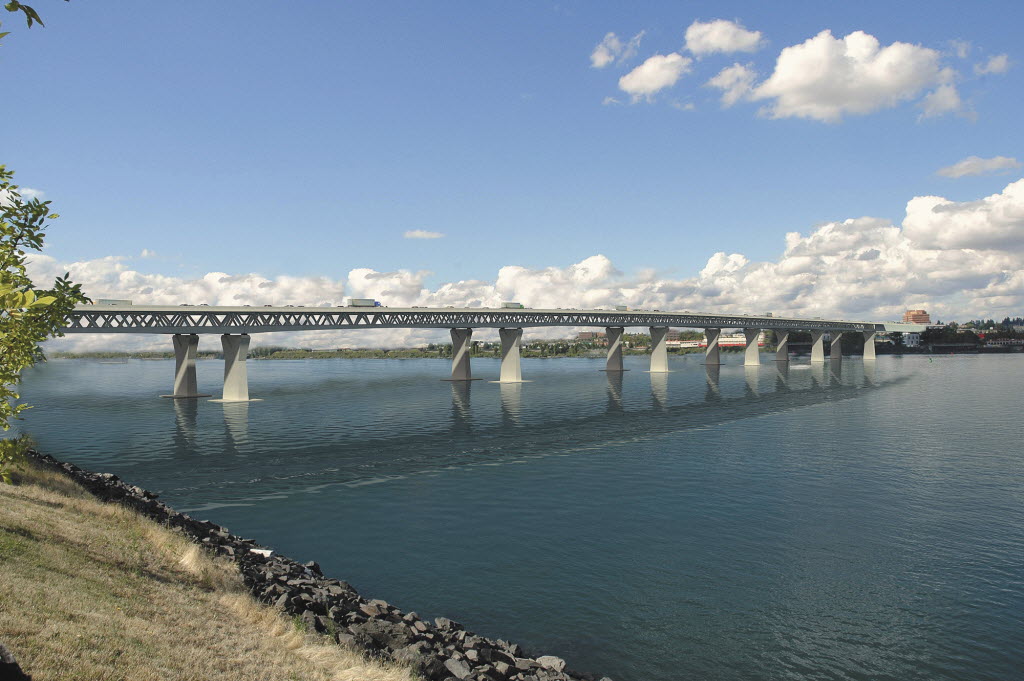On the same day Oregon lawmakers advanced a key funding bill for the Columbia River Crossing, three outspoken critics of the project underscored the project’s shortcomings, major financial risks and uncertainties during a public forum in Vancouver on Monday night.
Vancouver forensic accountant Tiffany Couch, Portland economist Joe Cortright, and John Charles, president of the Oregon-based Cascade Policy Institute, addressed a crowd of well over 200 in the Skyview High School auditorium. The three touched on different facets of the proposed $3.5 billion Interstate 5 Bridge replacement project. But each offered the same basic conclusion: The CRC is a bad deal for citizens in the two states footing most of the bill.
“There are very big risks to the taxpayers of Oregon and Washington if we move forward on this project,” Cortright said.
In addition to replacing the I-5 Bridge, the CRC would rebuild freeway interchanges on both sides of the Columbia River and extend light rail into Vancouver. Project leaders hope to begin construction as early as late next year.
Trent Campbell, who helped organize Monday’s forum, said he’s spent recent months trying to get answers on the CRC after paying only scant attention before. He said he was moved to dig into the issue after last November’s election, when voters rejected a sales tax measure to help pay for light rail in Vancouver. Campbell said he saw the result as a statement against light rail, though supporters vowed to push forward.
The progress continues despite significant financial questions surrounding the project, Cortright said. If there are any revenue shortfalls — or cost overruns — Washington and Oregon will be on the hook to cover those gaps, he said.
Couch said the project has spent about $168 million as of December. And despite a sticker price of $3.5 billion, she said, that number is closer to $5.5 billion when you include interest payments and other ongoing costs. Much of the project will be financed through borrowed money.
Meanwhile, the CRC continues to march forward as supporters look to capitalize on what they say is a finite window of opportunity.
Oregon House commits
Oregon’s funding bill, which authorizes the state to borrow $450 million for the CRC, sailed through the state House of Representatives by a 45-11 vote Monday. That included majority support from both Democrats and Republicans in the chamber.
Rep. Tobias Read, D-Beaverton, characterized the bill as an opportunity to finally commit to a project that’s been in the works for years. As the bill’s co-sponsor, Read said others would take notice of action in the Oregon Legislature.
“We have a chance to send a strong message to Washington state and Washington, D.C., about how important this project is to our region,” Read said during House floor deliberations, audio of which was posted online later in the day. “But this window will not remain forever.”
Oregon’s House Bill 2800, which now heads to the state Senate, attaches several conditions before Oregon can borrow $450 million to pay its state share of the CRC’s $3.5 billion price tag. Those “triggers” include Washington committing state money of its own, federal funding coming through, tolling revenue penciling out, and the U.S. Coast Guard signing off on a crucial bridge permit.
None of those is a sure thing at this point. But Read and other supporters were undaunted by that uncertainty, citing the economic benefits of relieving congestion in a major commercial corridor.
“It’s inevitable that a project of this magnitude carries with it some level of uncertainty,” Read said. “There are risks and costs to a program of action. But they are far less than the long-range risks and costs with comfortable inaction.”
That dynamic won’t change on the I-5 Bridge, he added.
“If we don’t act, problems increase, and solutions only get more expensive,” Read said.
In Washington, state House Democratic leaders last week rolled out a $10 billion transportation funding package that includes $450 million as Washington’s state share of the CRC. That plan hasn’t yet received a hearing or other action.
Eric Florip: 360-735-4541; http://twitter.com/col_enviro; eric.florip@columbian.com.




